Roadracers
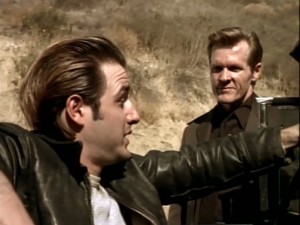 Whenever there’s a genre parody or ode to a specific era of films, such as Black Dynamite’s mocking of Blaxploitation films or Quentin Tarantino’s Death Proof, the second half of Grindhouse, the danger is that the film might fall into the trap of either being condescending without any particular insight, or so faithful that it becomes the very flawed thing it is emulating.
Whenever there’s a genre parody or ode to a specific era of films, such as Black Dynamite’s mocking of Blaxploitation films or Quentin Tarantino’s Death Proof, the second half of Grindhouse, the danger is that the film might fall into the trap of either being condescending without any particular insight, or so faithful that it becomes the very flawed thing it is emulating.
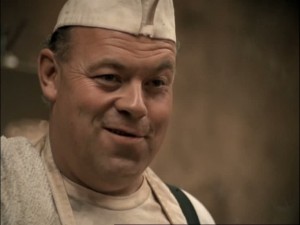 Black Dynamite has nothing new to say about Blaxploitation films, it just does a decent job of copying what an inept movie might look like. Of course, almost all Blaxploitation movies were humorously inept, and they didn’t look down on their audience or wink at us to make us aware that the filmmakers are better than their material. That’s a very important distinction, because Black Dynamite’s self-awareness is the very thing that makes it disingenuous.
Black Dynamite has nothing new to say about Blaxploitation films, it just does a decent job of copying what an inept movie might look like. Of course, almost all Blaxploitation movies were humorously inept, and they didn’t look down on their audience or wink at us to make us aware that the filmmakers are better than their material. That’s a very important distinction, because Black Dynamite’s self-awareness is the very thing that makes it disingenuous.
 On the other hand, Quentin Tarantino was obviously so familiar with Grindhouse films that for Death Proof, he copied everything, especially the fact that most Grindhouse films had 2 or 3 minutes of genius, surrounded by 85 minutes of padding. That’s why trailers for Grindhouse movies are so great; the editors cut together the only good parts of the film, giving you a hint of the concept which sounds promising, hoping to dupe you into the theater before word got out what a stinker the film was. Death Proof is so accurate that it’s frankly quite dull; long stretches of characters sitting around a table rambling about nothing in particular. There’s an early scene of amusement featuring Kurt Russell’s fascinating Stuntman Mike character killing a woman in his car, with his car, and then Russell disappears for a long time, before making another significant appearance in the last ten minutes. In between, Tarantino certainly nailed down the tediousness that doomed virtually every Grindhouse-style film of the 1970s (there are diamonds in the rough, but there’s a whole lot of rough), and his ultimate accomplishment is that he has successfully bored his audience.
On the other hand, Quentin Tarantino was obviously so familiar with Grindhouse films that for Death Proof, he copied everything, especially the fact that most Grindhouse films had 2 or 3 minutes of genius, surrounded by 85 minutes of padding. That’s why trailers for Grindhouse movies are so great; the editors cut together the only good parts of the film, giving you a hint of the concept which sounds promising, hoping to dupe you into the theater before word got out what a stinker the film was. Death Proof is so accurate that it’s frankly quite dull; long stretches of characters sitting around a table rambling about nothing in particular. There’s an early scene of amusement featuring Kurt Russell’s fascinating Stuntman Mike character killing a woman in his car, with his car, and then Russell disappears for a long time, before making another significant appearance in the last ten minutes. In between, Tarantino certainly nailed down the tediousness that doomed virtually every Grindhouse-style film of the 1970s (there are diamonds in the rough, but there’s a whole lot of rough), and his ultimate accomplishment is that he has successfully bored his audience.
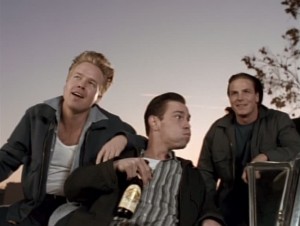 It was actually the first half of Grindhouse, Robert Rodriguez’s Planet Terror, that was considerably more entertaining, and not because it was so faithful to the genre. Planet Terror is frequently non-sensical because it appears that Rodridguez cut out all the boring parts that Tarantino fell in love with in Death Proof. Connective tissue is often missing in Planet Terror, it’s all high points, such as explosions, campy dialogue, ridiculous gore, sex scenes, and whatever else might thrill an audience with a short attention span. He did the same thing with last year’s Machete, which is a lot of fun, and makes just about as much sense as Planet Terror.
It was actually the first half of Grindhouse, Robert Rodriguez’s Planet Terror, that was considerably more entertaining, and not because it was so faithful to the genre. Planet Terror is frequently non-sensical because it appears that Rodridguez cut out all the boring parts that Tarantino fell in love with in Death Proof. Connective tissue is often missing in Planet Terror, it’s all high points, such as explosions, campy dialogue, ridiculous gore, sex scenes, and whatever else might thrill an audience with a short attention span. He did the same thing with last year’s Machete, which is a lot of fun, and makes just about as much sense as Planet Terror.
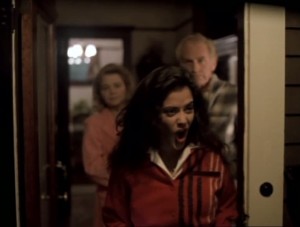 The fact that Rodriguez made a genre ode nearly 15 years before Planet Terror is not a surprise. His contribution to the 1994 Showtime series Rebel Highway, his remake-in-name-only of the 1950s juvenile delinquent time passer Roadracers, was quite clearly the highlight of the series, even when the other films were directed by established talent like Joe Dante, William Friedkin, Ralph Bakshi, and John Milius. In his book Roadracers: The Making of a Degenerate Hot Rod Flick, Rodriguez (who was coming off El Mariachi but hadn’t yet made Desperado) discusses his battle with the producers of Rebel Highway, and how he had to explain that he wanted to make a movie that had a contemporary energy to it, and all of the other films in the series seemed “old,” likely because he was at least 20 years younger than the other 9 filmmakers. The producers, including Lou Arkoff, the son of exploitation maven Samuel Arkoff, only had the façade of pure intentions, when what they really wanted was the most generic films possible. Rodriguez’s pitch, “imagine a movie like Grease or Happy Days, but where everyone dies at the end,” wasn’t the kind of conventional thinking Arkoff and company were after, but they had some other directors drop out of the series (like Wes Craven, who went off to make the meta-sequel New Nightmare) and needed Rodriguez to quickly and cheaply throw something together.
The fact that Rodriguez made a genre ode nearly 15 years before Planet Terror is not a surprise. His contribution to the 1994 Showtime series Rebel Highway, his remake-in-name-only of the 1950s juvenile delinquent time passer Roadracers, was quite clearly the highlight of the series, even when the other films were directed by established talent like Joe Dante, William Friedkin, Ralph Bakshi, and John Milius. In his book Roadracers: The Making of a Degenerate Hot Rod Flick, Rodriguez (who was coming off El Mariachi but hadn’t yet made Desperado) discusses his battle with the producers of Rebel Highway, and how he had to explain that he wanted to make a movie that had a contemporary energy to it, and all of the other films in the series seemed “old,” likely because he was at least 20 years younger than the other 9 filmmakers. The producers, including Lou Arkoff, the son of exploitation maven Samuel Arkoff, only had the façade of pure intentions, when what they really wanted was the most generic films possible. Rodriguez’s pitch, “imagine a movie like Grease or Happy Days, but where everyone dies at the end,” wasn’t the kind of conventional thinking Arkoff and company were after, but they had some other directors drop out of the series (like Wes Craven, who went off to make the meta-sequel New Nightmare) and needed Rodriguez to quickly and cheaply throw something together.
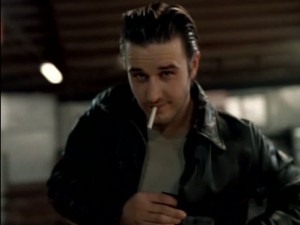 Rodriguez did both of those things, he shot Roadracers in a shorter schedule than his $7,000 El Mariachi (an urban myth really, the $7,000 is before the studio paid for Rodriguez to mix the sound, among other finishing touches), and was under the budget he was told he had, $1 million, and even less than his actual budget of $700,000. Rodriguez was using the film to gain experience on larger scale projects to prep himself for Desperado. He also wanted to convince Sony that the untested Salma Hayek was worthy of being the love interest in Desperado, so he put her in Roadracers as David Arquette’s girlfriend. Now Arquette fulfills all of the things that differentiate Roadracers from the other negligible films in Rebel Highway. His constant sneer seems just right and he had, as Rodriguez put it the “good sleaze factor.” His character, Dude Delaney, isn’t always making prudent decisions, and his unpredictability makes Roadracers unpredictable, not just a festival of Greaser movie clichés. Rodriguez has Arquette smoke constantly, to a level of parody (he did this to counteract the anti-smoking movement in Hollywood at the time), and while he doesn’t ignore it, the inter-racial relationship between Hayek and Arquette, which would have been a major faux pas in the time period the film is set (1956 or so, based on the constant references to the original Invasion of the Body Snatchers), isn’t the only topic of conversation.
Rodriguez did both of those things, he shot Roadracers in a shorter schedule than his $7,000 El Mariachi (an urban myth really, the $7,000 is before the studio paid for Rodriguez to mix the sound, among other finishing touches), and was under the budget he was told he had, $1 million, and even less than his actual budget of $700,000. Rodriguez was using the film to gain experience on larger scale projects to prep himself for Desperado. He also wanted to convince Sony that the untested Salma Hayek was worthy of being the love interest in Desperado, so he put her in Roadracers as David Arquette’s girlfriend. Now Arquette fulfills all of the things that differentiate Roadracers from the other negligible films in Rebel Highway. His constant sneer seems just right and he had, as Rodriguez put it the “good sleaze factor.” His character, Dude Delaney, isn’t always making prudent decisions, and his unpredictability makes Roadracers unpredictable, not just a festival of Greaser movie clichés. Rodriguez has Arquette smoke constantly, to a level of parody (he did this to counteract the anti-smoking movement in Hollywood at the time), and while he doesn’t ignore it, the inter-racial relationship between Hayek and Arquette, which would have been a major faux pas in the time period the film is set (1956 or so, based on the constant references to the original Invasion of the Body Snatchers), isn’t the only topic of conversation.
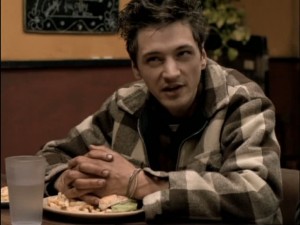 However, it’s not as if Roadracers is some revolutionary classic; it doesn’t have the propulsive pace or stylish ingenuity of other Rodriguez films (like Sin City or the first two Spy Kids films) and the closing credit outtakes completely undermine the drama of the film’s final scenes. A viewer might think that the outtakes were a result of producer interference, but they were Rodriguez’s idea all along. The smeary ghostlike low-grade video look of Roadracers was not Rodriguez’s idea; it was a lab error, which doesn’t change the fact that it hurts the film’s authenticity.
However, it’s not as if Roadracers is some revolutionary classic; it doesn’t have the propulsive pace or stylish ingenuity of other Rodriguez films (like Sin City or the first two Spy Kids films) and the closing credit outtakes completely undermine the drama of the film’s final scenes. A viewer might think that the outtakes were a result of producer interference, but they were Rodriguez’s idea all along. The smeary ghostlike low-grade video look of Roadracers was not Rodriguez’s idea; it was a lab error, which doesn’t change the fact that it hurts the film’s authenticity.
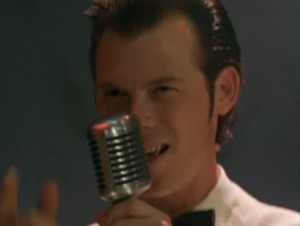 Roadracers is also a casualty of other significant behind-the-scenes work, namely sharing a music supervisor with Pulp Fiction. Due to Karyn Rachtman’s laziness, Link Wray’s Rumble and Ace of Spades appear in both Roadracers and Pulp Fiction, a problem since they were released a few months apart. And though it was Rodriguez who suggested the music for Rachtman to clear for Roadracers (which she then also suggested to Tarantino), since Pulp Fiction has such an iconic soundtrack, cementing specific songs in the social consciousness as associated with specific scenes, regardless of which came out first (Roadracers was on TV before Pulp Fiction’s theatrical release).
Roadracers is also a casualty of other significant behind-the-scenes work, namely sharing a music supervisor with Pulp Fiction. Due to Karyn Rachtman’s laziness, Link Wray’s Rumble and Ace of Spades appear in both Roadracers and Pulp Fiction, a problem since they were released a few months apart. And though it was Rodriguez who suggested the music for Rachtman to clear for Roadracers (which she then also suggested to Tarantino), since Pulp Fiction has such an iconic soundtrack, cementing specific songs in the social consciousness as associated with specific scenes, regardless of which came out first (Roadracers was on TV before Pulp Fiction’s theatrical release).
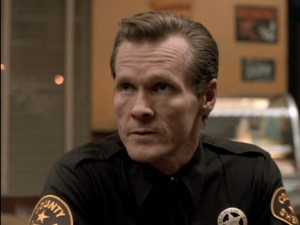 The unfortunate musical situation lends irony to a scene in Roadracers where Salma Hayek downplays a band’s lip synching with an argument that might simultaneously suit Milli Vanilli, Carlos Mencia, and Karyn Rachtman, “it’s just a song!” That’s not to suggest that Rodriguez doesn’t have any original ideas of his own, there’s a very funny moment in Roadracers involving greased up hair in a roller rink and in a different sequence, a new type of de-frocking is invented, de-wigging. These are the smaller details that Rodriguez gets right, and some of his casting, especially John Hawkes as Dude’s best friend, the squirrely Nixer (based on the film’s co-writer Tommy Nix), is just as spot on. William Sadler as the sheriff/villain is less inspired, but not a mark on the film, even if Rodriguez never properly explains the beef between Sadler and Arquette’s deadbeat father. But whatever was going on with Jason Wiles, as Sadler’s son, Teddy Leather, the local screw-up who has it in for Dude, is a mystery. Wiles isn’t convincingly evil enough to make a dent (and the least of the many subplots), and if the point is that he isn’t a clichéd villain, we never discover what, exactly, is so unique about him. The only thing that Wiles brings to mind is that he’s a product of nepotism, and Lou Arkoff already had that position well covered.
The unfortunate musical situation lends irony to a scene in Roadracers where Salma Hayek downplays a band’s lip synching with an argument that might simultaneously suit Milli Vanilli, Carlos Mencia, and Karyn Rachtman, “it’s just a song!” That’s not to suggest that Rodriguez doesn’t have any original ideas of his own, there’s a very funny moment in Roadracers involving greased up hair in a roller rink and in a different sequence, a new type of de-frocking is invented, de-wigging. These are the smaller details that Rodriguez gets right, and some of his casting, especially John Hawkes as Dude’s best friend, the squirrely Nixer (based on the film’s co-writer Tommy Nix), is just as spot on. William Sadler as the sheriff/villain is less inspired, but not a mark on the film, even if Rodriguez never properly explains the beef between Sadler and Arquette’s deadbeat father. But whatever was going on with Jason Wiles, as Sadler’s son, Teddy Leather, the local screw-up who has it in for Dude, is a mystery. Wiles isn’t convincingly evil enough to make a dent (and the least of the many subplots), and if the point is that he isn’t a clichéd villain, we never discover what, exactly, is so unique about him. The only thing that Wiles brings to mind is that he’s a product of nepotism, and Lou Arkoff already had that position well covered.



